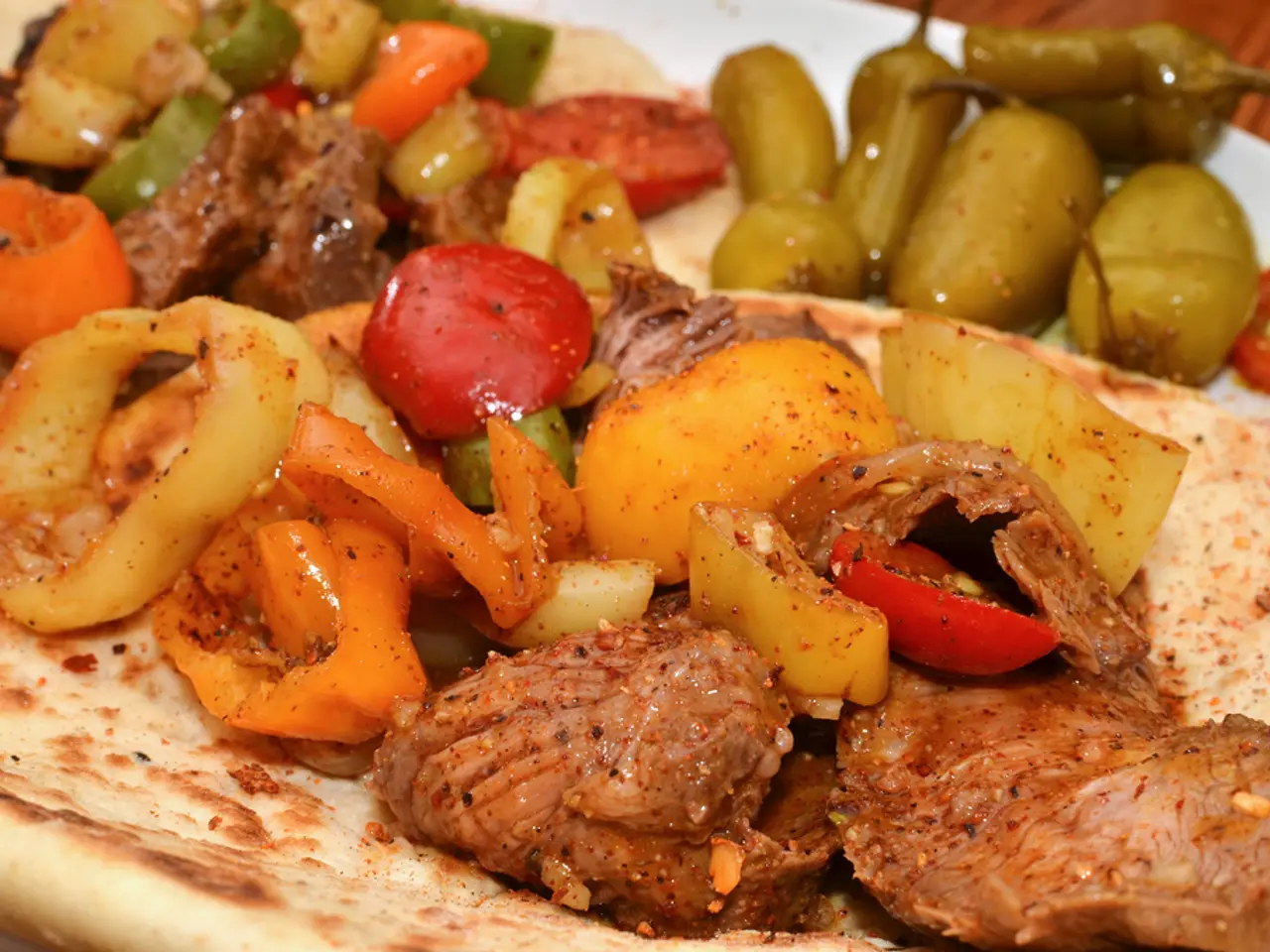Harmful Diet for Chickens: A List of Foods to Absolutely Avoid Feeding Them
In the poultry world, it's essential to be mindful of what we feed our feathered friends. Here's a list of the top 10 toxic foods for chickens and why they should be avoided:
- Avocado (especially pit and skin) Avocados contain a fungicidal toxin called persin, which can cause heart problems, breathing trouble, or death in chickens. Even a small amount can be fatal, with possible effects like oxygen deprivation and heart attacks.[1][3]
- Raw or Dried Beans Raw beans contain phytohemagglutinin, a lethal lectin toxin. Cooking destroys the toxin, but soaking is insufficient to detoxify them entirely.[1]
- Chocolate and Candy Chocolate and candy contain theobromine and caffeine, toxic to a chicken's heart and nervous system. Additionally, sugar and artificial colors can adversely affect chicken health.[1][4]
- Green Potato Skins and Sprouts Green potato skins and sprouts contain solanine, a poison that can cause diarrhea, weakness, and potentially death. Only cooked and peeled potatoes in small amounts should be fed to chickens.[1][5]
- Moldy or Rotten Food Mold produces mycotoxins, which can cause paralysis, sickness, or death. Chickens cannot reliably detect spoiled food, so it's critical to avoid feeding any questionable items.[1]
- Pine Shavings (Bedding) Pine shavings contain abietic acid and terpene hydrocarbons, which can damage a chicken's respiratory and liver function. Pine dust is carcinogenic, and long-term exposure can cause severe illness or death, though direct chicken studies are limited.[2]
- Tomato Leaves and Stems Tomato leaves and stems contain solanine and tomatine toxins, harmful if ingested by chickens. Only ripe tomato fruits (in moderation) are generally considered safe.[1]
- Raw Rhubarb Leaves Raw rhubarb leaves contain oxalic acid and other toxins harmful to chickens, potentially causing kidney damage and other severe health problems.[6]
- Onion Onions can cause oxidative damage to red blood cells, leading to anemia and weakness in chickens.[7]
- Garlic (in large amounts) Although sometimes fed in small quantities as a health supplement, large amounts of garlic can be toxic and cause digestive upset or anemia in chickens.[8]
Other foods to avoid include: - Peach and apricot pits, which contain cyanogenic glycosides - Nightshade plants like peppers, tomatoes, potatoes, and eggplants (all have toxic parts) - Cherry pits, also containing cyanide - Eggplants (leaves and stems), which contain solanine, like potatoes and tomatoes - Salty foods, as chickens cannot process too much salt - Greasy, fatty foods, which are hard to digest and not nutritious - Apple seeds, which contain small amounts of cyanide
It's crucial to remember that what may be a treat for humans can be a danger for chickens. Always research potential foods before feeding them to your flock. By being mindful of these toxic foods, you can help ensure the health and well-being of your chickens.
[1] Pet Poison Helpline. (2021). Chicken Poisoning. Retrieved from https://www.petpoisonhelpline.com/pet-safety-tips/chicken-poisoning/
[2] Pine Shavings and Chickens. (n.d.). Retrieved from https://www.backyardchickens.com/t/1251250/pine-shavings-and-chickens
[3] ASPCA. (n.d.). Avocado Toxicity in Dogs, Cats, and Other Pets. Retrieved from https://www.aspca.org/pet-care/animal-poison-control/toxic-and-non-toxic-plants/avocado-toxicity-in-dogs-cats-and-other-pets
[4] ASPCA. (n.d.). Chocolate Toxicity in Dogs, Cats, and Other Pets. Retrieved from https://www.aspca.org/pet-care/animal-poison-control/toxic-and-non-toxic-plants/chocolate-toxicity-in-dogs-cats-and-other-pets
[5] Pet Poison Helpline. (2021). Solanine Toxicity in Dogs, Cats, and Other Pets. Retrieved from https://www.petpoisonhelpline.com/pet-safety-tips/solanine-toxicity-in-dogs-cats-and-other-pets/
[6] Rhubarb Toxicity in Dogs, Cats, and Other Pets. (n.d.). Retrieved from https://www.petpoisonhelpline.com/pet-safety-tips/rhubarb-toxicity-in-dogs-cats-and-other-pets/
[7] Onion Toxicity in Dogs, Cats, and Other Pets. (n.d.). Retrieved from https://www.petpoisonhelpline.com/pet-safety-tips/onion-toxicity-in-dogs-cats-and-other-pets/
[8] Garlic Toxicity in Dogs, Cats, and Other Pets. (n.d.). Retrieved from https://www.petpoisonhelpline.com/pet-safety-tips/garlic-toxicity-in-dogs-cats-and-other-pets/
In the realm of pets, understanding the dietary needs of chickens is vital, avoiding potentially harmful foods such as avocado, raw or dried beans, chocolate, moldy food, green potato skins and sprouts, rhubarb leaves, onion, and garlic (in large amounts). On the other hand, home-and-garden items like pine shavings and nightshade plants should also be kept away from the flock. For a well-rounded lifestyle, education-and-self-development is key to ensure the health and welfare of your pet chickens, researching potential foods before feeding them. Food-and-drink options safe for chickens include ripe tomato fruits in moderation, but always remember that what's beneficial for humans may not be the same for our feathered friends.




